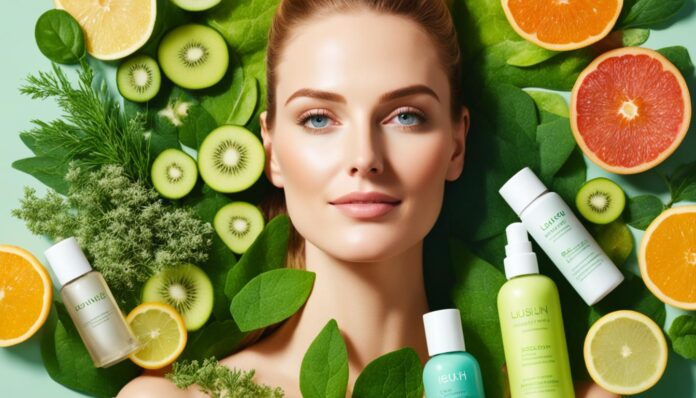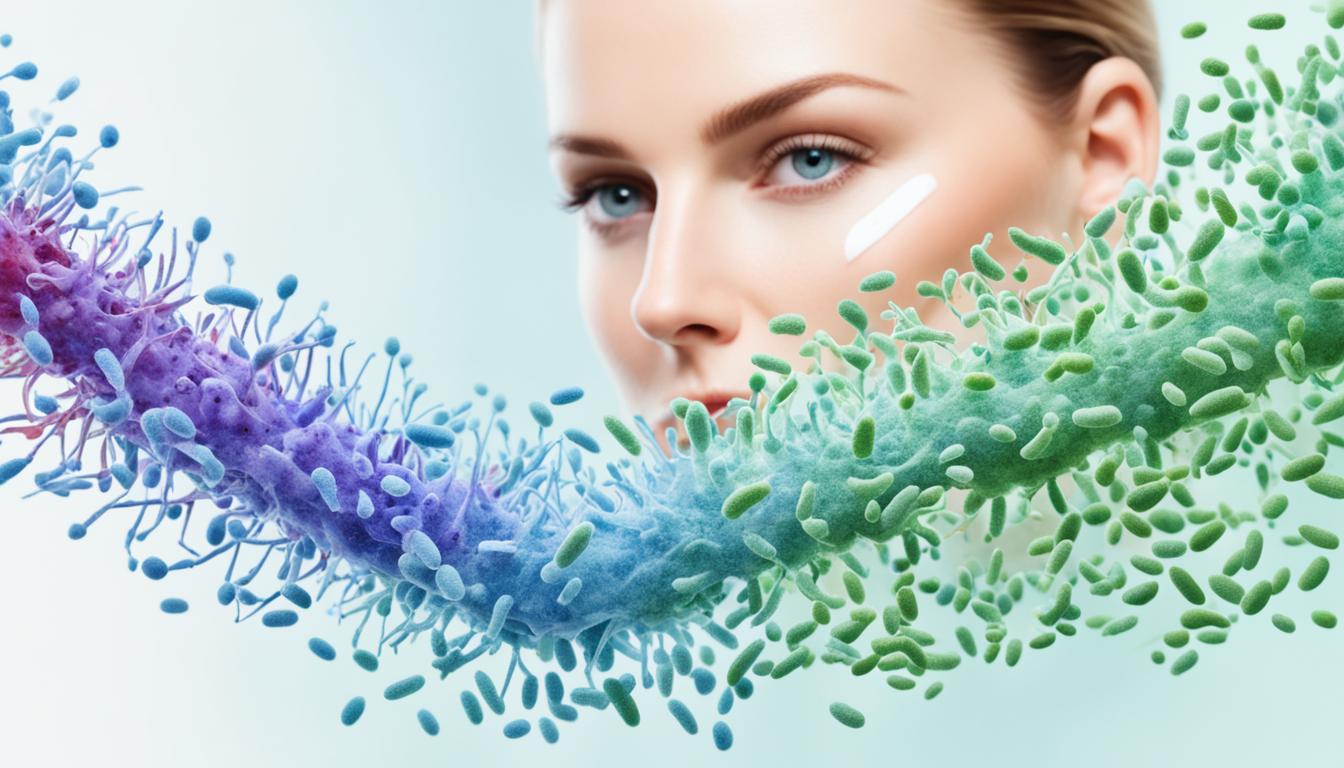
Did you know our skin is home to about one trillion microorganisms? These tiny creatures are key to our skin’s health. The rise of microbiome skincare has changed how we think about beauty and wellness. It shows us the power of keeping our skin’s ecosystem in balance.
By focusing on the good bacteria, yeast, and viruses on our skin, we can get clearer, brighter skin. Microbiome skincare is more than a trend. It’s a way to keep our skin healthy for the long term. It helps fight common skin problems and makes us look better.
Key Takeaways
- Microbiome skincare helps promote the balance of beneficial microorganisms on our skin.
- Understanding our skin flora allows for healthier skincare decisions.
- Products that support the skin microbiome can improve resilience and reduce inflammation.
- Gentle cleansing methods preserve the skin’s natural barrier.
- Organic, minimal, and waterless skincare formulations are gaining popularity.
Understanding the Skin Microbiome
The skin microbiome is filled with trillions of microorganisms like bacteria, fungi, and viruses. These tiny beings are key to our skin’s health. They help keep our skin in balance.
What is the Skin Microbiome?
The skin microbiome is the home of many microorganisms on our skin. It starts to settle down by the time we are three years old. But, it can change due to many things like our genes, what we eat, our lifestyle, and pollution.
The Role of Microorganisms in Skin Health
Microorganisms are vital for our skin. They protect us from bad germs, help our immune system, and keep our skin working right. A balanced skin microbiome means clear skin and better health.
Supporting these tiny helpers makes our skin stronger against problems.
Consequences of Microbiome Disruption
When the skin microbiome gets out of balance, it can cause skin problems. Things like harsh skincare, too much antibacterial stuff, and bad diets can upset this balance. This can lead to acne, eczema, vitiligo, and psoriasis.
It’s important to know and fix these issues to keep our skin microbiome healthy.
Benefits of Microbiome Skincare
Microbiome skincare brings many benefits for our skin’s health. It focuses on the balance of tiny organisms on our skin. This balance helps improve our skin’s barrier and makes our skin more resilient.
Enhanced Skin Barrier Function
The skin barrier protects us from harm and keeps moisture in. Studies show that using microbiome skincare can make this barrier stronger. A study with 25 Korean women found that using certain skincare products for four weeks changed their skin’s bacteria.
More good bacteria like Cutibacterium and Staphylococcus were found. This helps create a healthier skin environment. It also makes the skin more hydrated and smooth.
Improved Skin Resilience and Health
Having resilient skin helps us avoid irritation and sensitivity. A healthy skin microbiome makes our skin look better and stay healthy. A study showed a link between the skin’s bacteria and its health, like moisture and texture.
This shows why microbiome skincare is good for our skin. Brands like Kaibae and The Beauty Chef use this idea. They make products that help our skin barrier and fight inflammation. This makes our skin healthier overall.
| Study Details | Findings |
|---|---|
| Participants | 25 Korean women (average age: 43 years) |
| Duration | 4 weeks |
| Measurements | Skin hydration, texture, sebum content, pH |
| Microbial Changes | Increased Cutibacterium and Staphylococcus |
| Improvement Observed | Skin hydration and texture enhancements |
| Correlation Found | Significant link between microbial community and skin health parameters |
Principles of Microbiome-Friendly Skincare
Embracing microbiome-friendly skincare helps us take care of our skin’s ecosystem. It’s all about gentle cleansing and using fewer ingredients. These steps help keep our skin balanced and healthy.
Importance of Gentle Cleansing
Gentle cleansing is key in microbiome-friendly skincare. Harsh cleansers can take away essential oils, upsetting our skin’s balance. We should look for products without sulfates and parabens, as they can harm our skin.
Instead, we should use milder products. These keep our skin’s natural oils, helping good microorganisms thrive.
Utilizing Minimal Ingredients
Choosing products with fewer ingredients helps protect our skin’s microbiome. With fewer additives, we focus on what’s really important. This way, we support our skin’s health.

| Feature | Gentle Cleansing | Minimal Ingredients |
|---|---|---|
| Preservation of Natural Oils | ✔️ | ❌ |
| Reduction of Irritation Risks | ✔️ | ✔️ |
| Support for Skin’s Ecosystem | ✔️ | ✔️ |
| Potential for Breakouts | ❌ | ✔️ |
| Formulation Complexity | ❌ | ✔️ |
Probiotics and Prebiotics in Skincare
Exploring skincare takes us to the world of probiotics and prebiotics. These elements are changing the game for those looking to improve their skin’s health. By understanding their effects, we can make better choices for our skincare.
How Probiotics Support Skin Health
Probiotics are becoming popular in skincare for their ability to balance the skin’s ecosystem. They help strengthen the skin’s defenses by boosting the immune system and improving nutrient uptake. Products often use lysates or fermented extracts, packed with antioxidants, amino acids, and vitamins.
These ingredients help fight against skin issues like acne and dermatitis. Adding probiotics to our skincare routine helps our skin stay resilient against environmental harm.
The Function of Prebiotics in Nurturing Skin Microflora
Prebiotics are key for probiotics, acting as food that helps beneficial microbes grow in the skin. Ingredients like oat, rice, flaxseed, soy, glucomannan, and ginseng are common prebiotics in skincare. Using prebiotics boosts the balance of microbes in our skin.
This can lead to fewer signs of aging, better hydration, and less inflammation. Combining probiotics and prebiotics offers a complete way to achieve great skin health.
Choosing Organic and Waterless Skincare Products
Choosing the right skincare products is key to healthier skin. Opting for organic and waterless options can boost our skin’s health. Let’s explore why these choices are good for our skin.
The Benefits of Organic Ingredients
Organic skincare uses ingredients without harmful pesticides or synthetic fertilizers. This helps our skin’s microbiome stay healthy. Ingredients like calendula and jojoba oil are great examples. They improve skin health and work well with our skin, lowering irritation risks.
Waterless Formulations Explained
Waterless skincare products are known for their strong active ingredients. They don’t need many preservatives because they have less water. This makes them safer for our skin. Ingredients like oils and butters in these products help our skin stay healthy and hydrated.
| Benefit | Organic Ingredients | Waterless Formulations |
|---|---|---|
| Microbiome Support | Free from harmful chemicals | Reduced preservatives |
| Ingredient Quality | Naturally derived | Higher active concentrations |
| Environmental Impact | Less pesticide usage | Less water consumption |
| Skin Compatibility | Gentle on sensitive skin | Hygienic and pure |
Support Your Skin’s Natural Barrier
The skin barrier is our body’s biggest organ. It’s key to keeping our skin healthy. It shields us from things like extreme temperatures and harmful bacteria. To keep it strong, we should use ingredients that help it stay healthy.
Key Ingredients for Barrier Health
Using ingredients rich in ceramides and fatty acids is important. These help keep moisture in and support good bacteria. For example, Ren’s Evercalm range has products that help the skin barrier. The Gentle Cleansing Gel, Barrier Support Face Elixir, Overnight Recovery Balm, and Barrier Support Body Balm are great for this.
Effects of a Strong Skin Barrier on Microbiome Diversity
A strong skin barrier fights off bad stuff and helps good bacteria grow. This leads to healthier skin. Poor diet and stress can upset the balance of good and bad bacteria in our skin. Using skincare products that target the skin barrier helps keep the good bacteria in check. This is key to fighting acne and inflammation.

Microbiome Skincare for Eczema and Sensitive Skin
Living with eczema and sensitive skin can be tough. But, understanding the sensitive skin microbiome offers hope. It helps manage inflammation and boost skin health. By taking care of this ecosystem, we can get smoother, calmer skin. This reduces sensitivity and discomfort.
Management of Inflammation and Sensitivity
Products like Gladskin Eczema Cream are great for those as young as three months old. Many users saw changes in just a few days. With lots of positive feedback, it shows people need good eczema skincare options.
Adding probiotics to our skincare helps our sensitive skin microbiome. These good bacteria keep things balanced and fight inflammation. They soothe irritation, make the skin stronger, and keep pH levels right. This makes them key for our skincare.
Studies show that a bad skin microbiome can cause sensitivity and inflammation. So, picking the right products is crucial. Using probiotics in our skincare fights eczema and helps our microbiome.
Finding the right skincare is a big relief for many. Users are thankful for products that really work after trying others. By focusing on microbiome-friendly skincare, we can heal and find relief from eczema.
Avoiding Over-Sanitizing Practices
Keeping our skin healthy means finding the right balance between cleanliness and our skin’s natural balance. Using too many antibacterial products can upset this balance. This can harm our skin’s health over time. It’s important to use antibacterial products wisely.
Knowing the dangers of using too many sanitizers helps us take care of our skin. We should focus on keeping our skin healthy, not harming it.
The Risks of Excessive Antibacterial Products
Our skin is home to many different kinds of bacteria, fungi, viruses, and mites. These help keep us healthy. We carry about two pounds of microbes with us always.
It’s important to keep our skin clean, but using too many antibacterial products can harm both good and bad microbes. This has made our skin microbiomes less diverse, making us more likely to get skin problems like acne and eczema.
We need to be careful not to over-sanitize. Using harsh soaps too much can mess up our skin’s balance. Instead, we should use gentle cleansers and products that help our skin’s natural balance. Knowing how our lifestyle, diet, clothes, and hygiene affect our skin is key to keeping it healthy.
The Impact of Diet on the Skin Microbiome
Our diet greatly affects our skin’s health. Studies show a strong link between gut and skin health. A balanced gut microbiome makes our skin look better. By knowing how our food affects our skin, we can choose better foods for better health.
Connection Between Gut and Skin Health
The gut microbiome is key to the gut-skin axis. It affects our digestion and some skin conditions. For example, skin diseases like psoriasis come from gut and skin microbiota interactions. Better gut health means better skin health, showing how food is vital for balance.
Foods That Promote Microbiome Diversity
Eating a variety of foods helps our microbiome. Foods rich in probiotics and prebiotics are good for gut and skin health. Here are some foods that help our diet and skin microbiome:
- Fermented Foods: Yogurt, kefir, sauerkraut, and kimchi support probiotic levels.
- Fruits and Vegetables: High-fiber options like berries, apples, and leafy greens boost prebiotics.
- Whole Grains: Oats, barley, and quinoa contribute to microbiome diversity.
- Healthy Fats: Avocados and olive oil can have anti-inflammatory properties.
Considering this link, let’s make dietary changes for our gut and skin microbiomes. By choosing foods that increase microbiome diversity, we help our skin and improve our health and vitality.
Conclusion
Embracing microbiome skincare starts a journey to better skin health. It’s about more than just looking good. It’s about taking care of our skin’s ecosystem. This way, we focus on our skin’s health, not just how it looks.
Using products with probiotics and prebiotics is key to healthy skin. These ingredients help our skin stay balanced. They improve our skin’s barrier and fight inflammation and sensitivity.
Looking after our skin means thinking about our whole lifestyle. This includes what we eat and our environment. By focusing on our skin’s microbiome, we make our skin stronger. It not only looks great but feels great too. This shows the beauty of balance and care.
FAQ
What is microbiome skincare?
Microbiome skincare is all about taking care of the tiny organisms on our skin. It aims to keep our skin’s ecosystem in balance. This approach leads to healthier and glowing skin.
How do probiotics benefit our skin?
Probiotics are good bacteria that help our skin stay healthy. They keep the balance of skin microbes right. When we use them on our skin, they make it stronger against harm from the outside world.
Why are prebiotics important in skincare?
Prebiotics feed the good microbes on our skin. This helps them grow and keeps our skin’s microbiome healthy and balanced.
What should we look for in microbiome-friendly skincare products?
Look for products that are gentle and don’t have harsh chemicals like sulfates and parabens. They should also have few ingredients to help our skin’s natural balance.
Can our diet affect our skin’s microbiome?
Yes, eating foods rich in probiotics and prebiotics helps our skin and gut. This supports our overall health and makes our skin better.
What are the benefits of using organic skincare products?
Organic products don’t have harmful pesticides or fertilizers. They help our skin’s microbiome stay healthy. Ingredients like calendula and jojoba oil are good for our skin without harming the microbiome.
How do waterless formulations support the skin microbiome?
Waterless products have more active ingredients and need fewer preservatives. This creates a good environment for beneficial microbes. It helps balance our skin’s microbiome.
What role does a strong skin barrier play in microbiome diversity?
A strong skin barrier lets good bacteria thrive and keeps away bad ones. This is key for healthy skin and staying resilient.
How can microbiome skincare help with eczema and sensitive skin?
Microbiome skincare helps by keeping the right balance of microbes. This reduces inflammation and sensitivity. It leads to smoother skin and fewer flare-ups.
What are the risks of over-sanitizing our skin?
Over-sanitizing can get rid of both good and bad microbes. This upsets the skin’s balance. It’s important to use antibacterial products carefully to keep our microbiome healthy.
